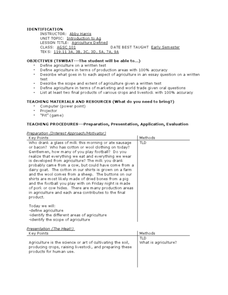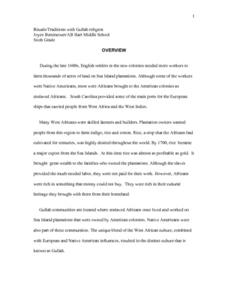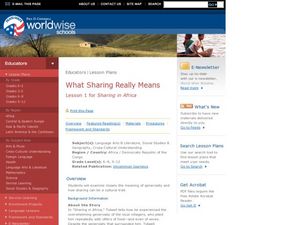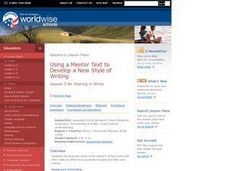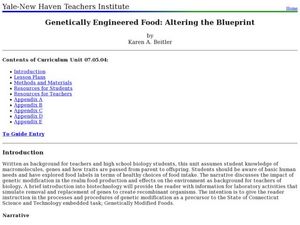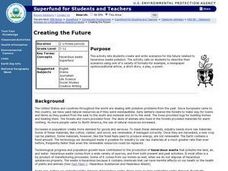Curated OER
Agriculture Defined
Open your Agriculture 101 course with a lesson on defining agriculture. Guide your class with thought-provoking questions and discussion. Give them time to play the card game, "Pit" in order to experience commodity exchange. This is a...
Curated OER
Rituals/traditions with Gullah religion
Sixth graders discuss some of the earliest people who lived in each region in order to comprehend how humans interacted with the environmental conditions at that time. They make connections to present-day regions including...
Curated OER
Seeing Things From the Someone Else's Point of View
Learners attempt to see the world from someone else's perspective. In this Peace Corps lesson, students read "Sharing in Africa." The piece challenges readers to consider how show respect for the cultural values of others while not...
Curated OER
What Sharing Really Means
Students examine the meaning of generosity and how sharing can be a cultural trait. In this cultural trait lesson, students read a text about the culture of generosity in Africa. Students complete a discussion activity and journal activity.
Curated OER
Agriculture in Your Life
Students examine the agricultural sources of everyday products and identify food products outside traditional farming circles. They discuss the background information, and complete activity sheets, locating various commodity locations on...
Curated OER
Arkansas State Anthem
Does your state have an anthem? Consider using it to launch a study of poetic imagery. Class members research the poet, the history of the song, the images presented, the format, and the tone. Conclude with a class sing-along.
Curated OER
Step by Step
Young scholars explore agriculture by creating a food production diagram. In this farming lesson, students read assigned text about the entities that assist in food production companies such as farmers, truckers and supermarkets. Young...
Curated OER
Kensington Mansion: Plantation, Sharecroppers, Tenants
Eleventh graders investigate the significance of the Kensington Mansion. In this South Carolina history lesson, 11th graders take field trips to the mansion and research primary and secondary sources about plantations, sharecropping, and...
Curated OER
The Living Corn Necklace
Fifth graders generate two types of corn seeds, Dent corn and Indian corn to compare the similarities and differences of each of the seedlings. The preferred seedlings are determined through observations made by Students.
Curated OER
THE PEANUT WIZARD
Students read information about George Washington Carver and outline the information. They are given peanuts in the shell, students examine them and eat them. Students discuss the following questions: Why did George Washington Carver...
Curated OER
Pumpkins . . . Not Just Part of Halloween
Students study the pumpkin. In this pumpkin lesson, students participate in different activities that explain the history of pumpkins and how pumpkins develop and grow, read "The Great Pumpkin Story" and answer comprehensive questions...
Curated OER
Seeing Things From the Someone Else's Point of View
Young scholars examine the cultural trait of sharing, trying to view it from the point of view of someone in another culture. They question what we gain from trying to see the world from the perspective of another person or culture and...
Curated OER
Using a Mentor Text to Develop a New Style of Writing
Students examine some of the author's writing traits and then make an effort to incorporate his style into their own writing. They show how richly written literature can be used as a mentor text, or model, for improving one's own writing.
Curated OER
Genetically Engineered Food: Altering the Blueprint
Young scholars explore the genetic engineering of food. In this health activity students explain how DNA technology can be used to produce food.
Curated OER
What Sharing Really Means
Students read the story "Sharing in Africa". As a class, they brainstorm a list of holidays and celebrations in various cultures and identify the Congo on a world map. To end the lesson, they focus on one paragraph of the story,...
Curated OER
Children in the Fields
Fourth graders research Hispanic child labor in California's agricultural period. They create dioramas reflecting the lives of migrant farm workers and political cartoons as produce crate labels, They illustrate farm scenes and hold a...
Curated OER
Creating the Future
Students work together to develop and write scenerios for the future of hazardous waste cleanup. They share their scenerios with the class. They complete activities as well.
Curated OER
Those Busy, Buzz'n Worker Bees
Young scholars research information on worker bees. In this insect lesson, students review the body parts of insects and how bees find flowers. They discuss compound and simple eyes and the life cycle of a worker bee.
Curated OER
Too Bee Or Not To Bee
Students recognize that bees are important in the reproduction of plants and to the survival of animals. In this bee lesson, students become familiar with the parts of bees and how those adaptations help them pollinate plants....
Curated OER
Folktales: Uncle Cricket, the Soothsayer Lesson Ideas
Students read the Nicaraguan folktale, "Uncle Cricket, the Soothsayer," prior to participating in various activities. Among the ideas presented here are completing story maps, analyzing characters, summarizing the plot, writing...
Curated OER
Where Does It Come From?
Learners examine food sources. In this agriculture activity, students investigate how food is stored, moved, and processed as they participate in a classroom activity.
Curated OER
Be A Bug Scout
Students perform outside activities to determine the amount of insects, flowers, or common weeds within an area. They predict the number of insects they will find within their square area. Using calculators, students organize the data...
Curated OER
Experimenting with Peanuts
Students investigate peanuts. For this science lesson, students explore the properties of the peanut and shell. Students burn a peanut to observe the peanut oil. Students taste test different types of peanut butter.
Curated OER
When Rice Was King
Students examine the origins of rice production in the South. They identify the steps involved in rice cultivation, examine photos of plantation life, conduct interviews, and research the economic base of their own community.
